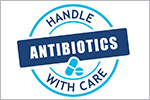Antimicrobial Resistance - WHO consultation update

Antimicrobial resistance is resistance of a microorganism to an antimicrobial drug that was originally effective for treatment of infections caused by it.
In layman's terms, antomicrobial resistance can be described as "antibiotic resistance".
This occurs when bacteria change and become resistant to the antibiotics used to treat the infection they cause.
Yesterday (29th Feb 2016) the World Health Organization held a consultation on options for establishing a global development and stewardship framework to fight antimicrobial resistance. The consultation was held in response to operative paragraph 4(7) of World Health resolution WHA68.7 that endorsed the Global action plan on antimicrobial resistance. The meeting was open to Member States, non-governmental organizations in official relations with WHO and intergovernmental organizations.
Senior Food Standards Officer Annamaria Bruno represented the Codex Secretariat at the meeting. "The consultation had a good participation and a lively and open discussion", she said "and participants had the opportunity to comment on various parts of the draft document."
WHO has now requested additional inputs from Members States, and international organisations including FAO, Codex and OIE, to be provided in the next two weeks so that a further draft can be prepared for presentation at the next session of the World Health Assembly in May 2016.
Links
Consult the 29 Feb. meeting documents on the WHO website.
Learn more about antomicrobial resistance from FAO.
Download Codex texts on foodborne AMR.
At the heart of the Codex mandate are the core values of collaboration, inclusiveness, consensus building and transparency. Governmental and non-governmental, public and private organizations alike play a vital role in ensuring Codex texts are of the highest quality and based on sound science.
Codex would have little authority in the field of international standard setting if it did not welcome and acknowledge the valuable contributions made by observers. Expert technical bodies, industry and consumer associations
contribute to the standard-setting process in a spirit of openness, collaboration and transparency.
Intergovernmental organizations (IGOs) and international non-governmental organizations (NGOs) can apply for observer status in Codex in order to attend and put forward their views at every stage of the standard-setting process.
 Current Codex Alimentarius Commission
Current Codex Alimentarius Commission
Antimicrobial Resistance - WHO consultation update

Antimicrobial resistance is resistance of a microorganism to an antimicrobial drug that was originally effective for treatment of infections caused by it.
In layman's terms, antomicrobial resistance can be described as "antibiotic resistance".
This occurs when bacteria change and become resistant to the antibiotics used to treat the infection they cause.
Yesterday (29th Feb 2016) the World Health Organization held a consultation on options for establishing a global development and stewardship framework to fight antimicrobial resistance. The consultation was held in response to operative paragraph 4(7) of World Health resolution WHA68.7 that endorsed the Global action plan on antimicrobial resistance. The meeting was open to Member States, non-governmental organizations in official relations with WHO and intergovernmental organizations.
Senior Food Standards Officer Annamaria Bruno represented the Codex Secretariat at the meeting. "The consultation had a good participation and a lively and open discussion", she said "and participants had the opportunity to comment on various parts of the draft document."
WHO has now requested additional inputs from Members States, and international organisations including FAO, Codex and OIE, to be provided in the next two weeks so that a further draft can be prepared for presentation at the next session of the World Health Assembly in May 2016.
Links
Consult the 29 Feb. meeting documents on the WHO website.
Learn more about antomicrobial resistance from FAO.
Download Codex texts on foodborne AMR.
 Codex and Observer
Codex and Observer
around the world since ancient times.
We might not always know where it comes from,
but we expect it to be available, safe and of good quality.









Leave a comment